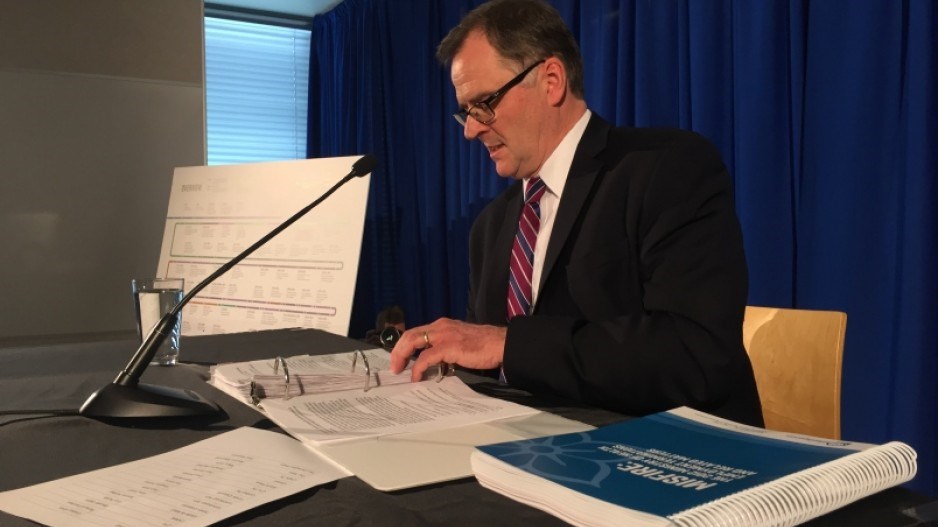A flawed investigation guided by suspicion and driven by rushed decision-making led to the wrongful firing of seven drug researchers — one of whom later took his own life, a new report shows.
Ombudsperson Jay Chalke concludes in a 488-page report that researchers unfairly suffered significant personal, financial and professional harm.
He calls for government to make “goodwill” payments ranging from $15,000 to $125,000, and in some cases, provide written apologies to the people affected.
He also recommends the province establish a $500,000 scholarship endowment at the University of Victoria to honour the memory of researcher Roderick MacIsaac, who committed suicide. Chalke concluded that MacIsaac did nothing wrong.
“Mr. MacIsaac’s death was a tragedy that has cast a dark shadow over this entire affair,” Chalke said at a news conference Thursday.
The report says the case began with a complaint about contracting and data practices that was “almost entirely inaccurate” and was never properly assessed by investigators. The investigators made assumptions and jumped to conclusions, conducting poorly planned and confrontational interviews.
“Objectivity is fundamental to a fair and effective investigation. Based on our review of taped evidence, transcriptions, documents and talking to individuals involved in the investigation, we consistently found investigators did not approach interviews with an open mind,” Chalke said.
“The tone adopted by some interviewers in some interviews was in many cases disrespectful, badgering and confrontational. These investigations were conducted unfairly and ineffectively and resulted in decisions being made on the basis of unreliable, incorrect and incomplete conclusions.”
Officials then acted on the work of investigators and wrongly concluded that employees’ conduct warranted dismissals, he found.
The breakdown occurred in part because a number of government controls and practices were not followed, Chalke said.
The dismissals were rushed, the human resources process effectively collapsed and there was confusion about the scope of the legal advice provided — all of which resulted in terminations that were unjustified, he said.
Chalke says the decision to fire six health ministry employees was made by former deputy health minister Graham Whitmarsh without any political interference. A seventh employee was constructively dismissed. The government also suspended or terminated a number of ministry contracts, costing at least one other researcher a job and many had their livelihoods seriously affected.
The government announced four of the dismissals and three suspensions in 2012 and said they had asked the RCMP to investigate.
Chalke said it was wrong to mention the RCMP because the force had told the ministry that they would not even make a decision about whether to investigate until a final report was received from the ministry.
Making such an important decision in a needlessly hurried way led to bad choices being made, he said.
In addition to the “goodwill” contributions to affected individuals, Chalke also recommended creating whistleblower legislation that would not only protect whistleblowers, but also the potentially innocent people who face accusations, by clearly defining the process for investigating allegations.
He requested the province respond by April 20.
Kim Henderson, Deputy Minister to the Premier and head of the B.C. Public Service, acknowledged the failings of multiple departments and thanked the ombudsperson for his report.
“I would like to offer my unqualified and comprehensive apology to all who were adversely affected by public service conduct,” she said.
Henderson said government will move forward on all Chalke’s recommendations, including good will payments and the scholarship endowment.
“I can advise that we have already started looking at a reparation process for those affected by the Ministry of Health firings and its aftermath,” she said, adding that she has briefed Premier Christy Clark and cabinet and they are supportive of these actions.
Henderson said she needs time to consider Chalke’s advice before deciding whether any employees will face discipline. She noted that Chalke advised against it, arguing that the time for assigning blame through discipline has passed.
The researchers were fired in 2012 after Ministry of Health publicly alleged a privacy breach and contract irregularities, claiming an RCMP investigation was underway.
Three months later, MacIsaac, a University of Victoria PhD student committed suicide.
When his family asked for answers, the government conceded the firing was wrong and heavy-handed and that the data had only ever been used for research purposes.
— with files from Cindy E. Harnett




